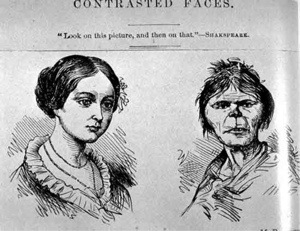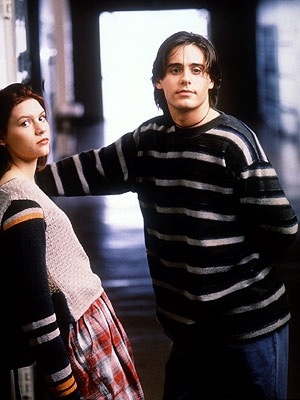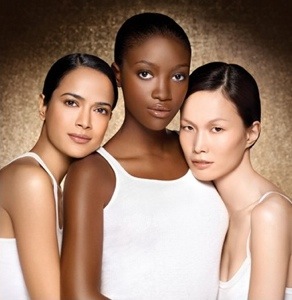I’ve done a lot of thinking about this question, both the variant asking whether I am a person of color, and more to the point, if I am a woman of color (I think less about “Am I a Woman?” … I’m at peace that I am)*. When I’ve asked Caucasian feminists to weigh in, they usually answer with an immediate (and cursory?) “yes.” I think this is correct, but an equally resounding “no” is important, and I think the full story is not told without both the yes and the no.

Before it became fashionable to be Irish once a year for St. Patrick’s day, and whenever Guiness is poured or Celtic music is played, or just because one always fancied red hair, Irish Americans were the targets of a lot of racism by the “white” minority, who were somewhat less white than them
Let me start with the “no.” First, it’s important to consider that, much like the question of whether pink is for boys and blue is for girls, or vice versa, the answer to the question, “Who is white?” has changed. Riots among Anglo-Saxon (“white”), Irish, and Italian Americans in the early 20th century were characterized as race conflicts. The concept of being “white” has always really been rooted in Colonialism and control of people. “White” people were Europeans who exerted control, and “colored” people were the othered people they subjugated – predominantly Africans and indigenous Americans. Asians have long played an indeterminate role in this equation. Some of us, and sometimes, were othered as colored people, but other times, we were not. Even in the Colonial era, India had a more complex and different relationship with the crown than any other nation predominantly peopled with “colored folk.” This did not stop us from getting called names – you will occasionally even see the “N word” used to describe my ancestors by Britons (e.g., in passing in the wondrous Passage to India by E. M. Foster). I don’t want to get too sidetracked on this – complex is really a key word, and it has the funny consequence that, were in the UK instead of the US, there would be a lot more Indian faces around me, and certainly far more Indian food, but I would also be far more marginalized than I am here. I simply want to say that our experience was far different than our sisters and brothers in Africa and South America.
More recently and humorously, the mid-2000s pass-time that was Stuff White People Like listed things, well, that white people like, and I’m embarrassed to admit how many are true of me (this is part of the gag, incidentally – the blog was created by an Asian American). So, much like Othello, I am called often whiter than many of my unequivocally “white” girlfriends (I’ve only ever had one non-Caucasian girlfriend, although I’ve gone on dates with people of a variety of ethnicities). Many of my less-grounded-in-feminism women friends have told me they think of me as white. It’s not as simple as that.

It’s fantastic that Stuff White People Like ended on My So Called Life. And I may be the stupidest woman alive in listening to all this Dallas Buyers’ Club debating and not realize that Jared Leto was Jordan Catalano
However, all of this should actually be easy to think about by analogy for my feminist and LGBTQIA+ friends – there’s a lot of complaining about traditional gender roles within the “binary.” (I was caught by surprise at a recent support group meeting – someone didn’t know the word; it’s come up in so many conversations in the last half year that I guess I forgot it was not a household concept. That binary is the gender binary that misrepresents maleness and femaleness, or masculinity or feminity, as being opposing states of a binary system, most crudely represented by “1” signifying the “presence” of masculinity and “0” representing the “absence” of femininity). If anything, the white/colored “binary” is far more, not less flawed and nonsensical than the male/female binary. The latter has existed across time and culture and is likely a basic (but malleable) part of the human competing strategy, and many animal ones as well. The former is rooted in an extremely narrow and Eurocentric conception of history. So, while I endorse the gender binary (for me – I am a femme and attracted to moderately masculine/butch people – I don’t push the gender binary on others or police their gender), the “race binary” is just dissonant with my experience, and in this way, I am leery of identifying as a trans woman of color, because it endorses the underlying binary.
A corollary to this: it is vitally important for people like me to remember that marginalization and oppression actually make up a relatively small part of our life histories and experiences. I mean, let’s be real. My Brahmin ancestors came from significant privilege even under the oppression of the British Raj. My parents are black sheep in my family, to some extent, because neither have a doctorate (both have masters degrees in Chemistry – in my family, when you tell an auntie you have a masters degree, they ask why you dropped out). My experience of being a trans woman is far more Coach purses and flash sales at the Limited than homelessness or poverty. It’s the kind of experience being trans where, in more than six months of coming out to more than a hundred people, I’ve had no negative responses and only actively felt gaped at twice. By this standard, arguably the President’s daughters are not women of color, either. I recognize that’s an audacious thing to say, and I don’t want to police their choice to identify or not identify as women of color. I just fear that we privileged (but non-Caucasian) women talking about oppression of racial minorities, as if our direct experience of it is enough to offer a fully informed perspective, run a risk of doing something almost as bad as “mansplaining.”
But that answer, by itself, is simply not complete.
There is also the obvious “yes.” I don’t quite have “skin the color of mocha” (my life is much closer to a queer Taylor Swift song than a queer Ricky Martin song). It’s more like honey, but it’s for sure not alabaster. A woman (of whose ethnicity I am unsure) came up to me at a support group recently and said she was glad another woman of color was there (this town is not so non-diverse, but some of it’s spaces can be amazingly over-representative of Caucasians compared to our city population).

I clearly need to consider the subset of products marketed at “women of color,” or at least some of them, anyway, and scads of makeup trends will just never work for me, oh well … I could do worse than these women
Let me go briefly back to leveraging my certainty that I am a woman. I don’t have a uterus, and it’s unlikely I ever will. To my regret, I will never have a child grow inside me. This does mean that I should defer to the voices of women with uteruses (and those who used to have them) in many matters reproductive. But it does not mean that it is not an important part of my experience as a woman to co-advocate with these sisters (I love my sisterhood), and when I do so, I do so in a meaningfully different way than me advocating on behalf of other oppressed groups, in that I am advocating as a fellow woman (just as women stand up for me as a fellow woman – that night I met my girlfriend, her ex did this for me, and it was so amazing).
Furthermore, while I have not experienced so much oppression, I know what it’s like to be othered in subtler ways. I know what it’s like to not conform to the magazine image of beauty, my transness even aside – all the hair colors or makeup that don’t work with my skin, not having the “it” blue or green eyes, and so on. (In spite of having a purely Brahmin Indian lineage going back hundreds of years, I don’t exactly look like most other Indian Americans, either, that’s a topic for another time.) Interestingly, I serve and, in past settings, worked alongside many African American people, and every once in a while, one of the women compliments my having the “good hair,” (if you don’t understand what the phrase means specifically…). To be honest, I am immensely flattered that they sort of considered me one of them, since it’s not a comment they would make to Caucasian people, and certainly not to most people nominally perceived as male, as I was at the time! I know what it’s like to have a name that’s different (the name I chose occurs in several languages, including Sanskrit, but my birth name is common to Indians but not to most Americans, and instantly foreign and “exotic” sounding to Americans… to have fun with them, I point out that it means “mesmerizing” or “charming,” like a snake charmer!). I know what it’s like that the food and customs in my home were “foreign” to my peers.
In essence, I co-advocate with women not only on the basis of our co-humanity, but on shared experiences and interests and perspectives shaped by shared experiences (past, present, and future), which we have in common as women, but which men do not generally share. I do co-advocate, in this very same way, with other women of color, even if we have non-overlapping histories. There are even some ways in which my history as a woman of color (or those of other less marginalized women of color) may be uniquely informative – Lindsey Yoo makes a great case for this. I willingly and gladly take my place alongside other women of color (some of whom were oppressed a lot, and others, like, me, oppressed little or not at all), because I think the world will be a better place when these sisters and I experience less oppression and othering. While doing so, I remember my privilege. I remember that each of us occupies a unique intersection of different forces that privilege us and predispose us to oppression and marginalization. And I stand in the doorway and bid you in – because we are all better together.
* This blog post has an embarrassing number of parentheticals. Radical feminists love parentheticals almost as much as we love footnotes. I just love you so much that I can’t leave the good parts out on you.
This is really interesting; I’ve been thinking a lot about this same topic, but from the opposite perspective. I’m often read as white, but I’m actually of Hispanic heritage– am I a person of color? Or no, because I’m “read” as white?
I’m tending towards no because Spain is in western Europe so perhaps the distinction is pedantic anyway, as I’m not Latino, I’m Castillian. But as the summer winds on, no one who doesn’t know me will consistently read me as white– they’ll all read me as Latino, because I tan early and easily. So am I a person of color during the summer, when I experience what it is like for a few months? Or not, because once it gets cold again my skin returns to the pale olive that is my “natural” state?
I’m babbling. Point is, I like this 🙂
So as a Castillian, you consider yourself part of the ethnic majority / dominant group in Spain, correct? I’m curious, if you travel to Northern Europe, do you or other Castilians experience any issues either because you look or speak differently from Scandinavian/Germanic/Anglo etc people of the North, or even because of any of the stereotyping that the Northern European cultures tend to do of the south (e.g. With the differences for instance in the state structure, economy, employment, etc, between the north and south)? Or do they ever go so far as to conflate Spanish people with the influx of Turkish people and people from non-European countries who come to Northern Europe seeking employment?
Europeans who visit the US in my experience are usually a “privileged” minority (somewhat like me) in that people tend automatically towards positive or favorable impressions of them and their culture. I don’t know nearly as much as what it is like in Europe, excepting that the experience of Indians in the UK is a very different experience than in the USA.
And thanks as always for your comments, darling, I love reading your thinking! ❤️
In Spain, yes, I would be part of the dominant group. And here I get read as white, so I’m part of the dominant group as well, and try to be very conscious of the fact that I carry white privilege, even while being marginalized as a queer trans boi.
I suppose I was more agreeing with the idea of a racial spectrum being a lot more complicated than a binary.
I love reading your thinking too ❤ I'm in deep, passionate internet love with you. I will forever read your blog. 🙂
Pingback: HIV And The LGBT Community: Getting My First HIV Test… And Some Education | Mira Charlotte Krishnan
Pingback: Why I Want You to Rethink Everything You Thought You Knew about Being An Ally | Mira Charlotte Krishnan
Pingback: Teaching People to “Get” Privilege | Mira Charlotte Krishnan
Pingback: Living Like Black Lives Actually Mattered | Mira Charlotte Krishnan
Pingback: On Being a White Feminist (No, Wait, Please Hear Me Out) | Mira Charlotte Krishnan